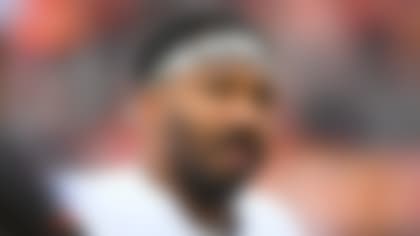Over the past few months, the NFL and its players have used their prominent platform to ensure the dialogue surrounding the need for criminal and social justice reform in the United States stays alive and leads to tangible change.
Commissioner Roger Goodell joined former NFL linebacker Emmanuel Acho to continue that important conversation Sunday night.
During an appearance on Acho's popular YouTube series, Uncomfortable Conversations with a Black Man, Goodell addressed where he currently stands regarding players choosing to peacefully protest during the national anthem.
The son of former U.S. congressman and Republican Senator Charles Goodell, the Commissioner cited how growing up in the 1960s and watching his father navigate politics showed him the value of listening to differing viewpoints when trying to fully understand a divisive situation. When asked what he knows about the protests now that he wished he knew four years ago when Colin Kaepernick began raising awareness, Goodell admitted talking directly with players opened his eyes to the reality of what was happening.
"Just what was going on in the communities. I didn't know what was going on in the communities," Goodell told Acho. "And when I had the chance to sit with our players, I never had the chance to sit with Kaep but I talked with Kenny Stills a lot, Eric Reid, Malcolm Jenkins, Anquan Boldin. So many other players that you know, some of them sacrificed a great deal."
The impact these conversations had on Goodell could be felt in the powerful statement he released in June in which he acknowledged that the NFL was "wrong for not listening to NFL players earlier." Acho noted the importance of the comments and how much they resonated with him as a Black man and former player, but made sure to highlight the lack of a message aimed directly towards Kaepernick, who he described as the "catalyst of it all." Acho then gave Goodell the floor to share what he would say if he could publicly express his remorse to the former 49ers QB.
"Well, the first thing I'd say is I wished we had listened earlier, Kaep, to what you were kneeling about and what you were trying to bring attention to. We had invited him in several times to have the conversation, to have the dialogue. I wish we had the benefit of that. We never did and, you know, we would've benefited from that. Absolutely," he said.
Ten days after making headlines in June, Goodell stated that he encouraged a team to sign Kaep, who hasn't played since 2016. While that signing has yet to materialize, what likely will once the season kicks off on Sept. 10 will be players kneeling in protest along NFL sidelines like Kaepernick once did. Such action could re-ignite conversations about a perceived disrespect being shown towards the American flag, something Acho re-iterated the kneeling never intended to represent. Goodell had a message for those who still carry that belief.
"It is not about the flag. The message here that what our players are doing is being mischaracterized," he explained. "These are not people who are unpatriotic. They're not disloyal. They're not against our military. In fact many of those guys were in the military and they're a military family. What they were trying to do is exercise their right to bring attention to something that needs to get fixed. That misrepresentation of who they were and what they were doing was the thing that really gnawed at me."
Among the many issues the protests are aiming to address, the push to end systemic racism and police brutality remain at the forefront. The horrific murder of George Floyd while in police custody in May shed a necessary light on what's been happening in the shadows for centuries. As was the case for many people, witnessing that tragedy sparked in Goodell the need to explore ways he and his contemporaries could do more to help, efforts that have manifested in multiple ways league-wide.
The subsequent involvement he's had in communities in the months since proved to also be watershed moments for Goodell in terms of better understanding what his players have been so vocal about. The experiences he had attending bail hearings, going on police ride-alongs and speaking with families who are victims of police brutality are ones he says affected him a great deal.
"It helped me understand better. People can hear it but they're not connected to it. I never experienced it. I never experienced domestic violence in my life. But when I went to call center and I listened to victims and heard what they were saying and what they were going through and you could hear the fear in their voice. Yeah, it changes you. Yeah, you feel that deeply," he shared.
The conversation can be viewed in its entirety . Part 2 of the discussion will premiere on Acho's self-titled YouTube channel Monday night. Acho is also slated to appear earlier in the day on Inside Training Camp Live at 6:30 p.m. ET.












